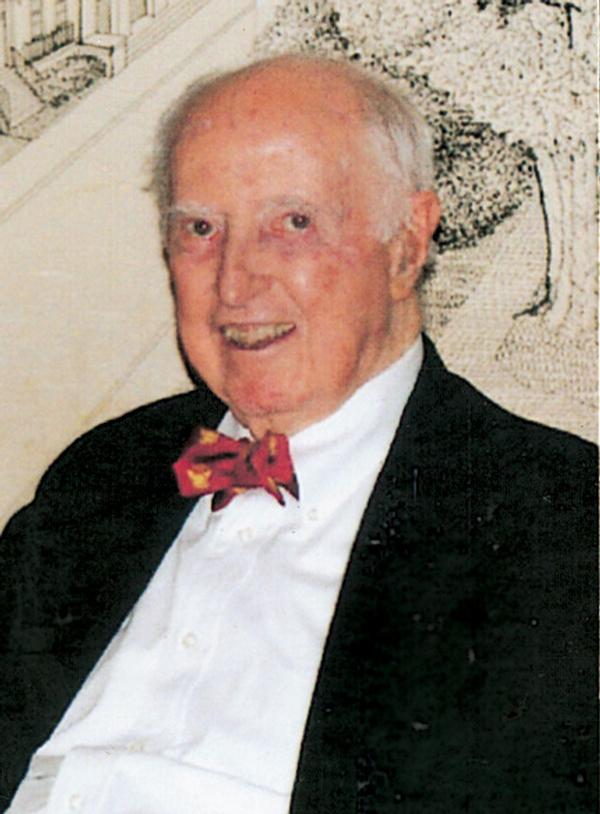Necrology
Because Hamilton Remembers


Henry Harcus Work '33
Nov. 11, 1911-Mar. 21, 2007
Henry Harcus Work ’33, long prominent in the fields of child psychiatry and medical education, grew up in Buffalo, NY, where he was born on November 11, 1911. He was the younger son of Henry H., a banker, and Jeanette Harcus Work. Young Henry entered Hamilton in 1929, following his graduation from Buffalo’s Bennett High School. Having observed as a child the medical ministrations to his older brother, who suffered from mental retardation, he decided to become a physician. On the Hill, he joined the Emerson Literary Society, as well as the Choir. He also managed the tennis team but devoted most of his abundant extracurricular energies to student publications as an editor of Hamilton Life and managing editor of the 1933 Hamiltonian. Elected to the journalism honorary Pi Delta Epsilon, he also excelled in his premedical studies, earning election to Phi Beta Kappa and graduation with honors in 1933.
Henry Work went on to Harvard University’s School of Medicine, where he acquired his M.D. degree in 1937. After an internship at Children’s Hospital in Boston, MA, and a six-month residency at the Emma P. Bradley Home in Providence, RI, specializing in children’s neuropsychiatric disorders, he returned in 1940 to his native Buffalo to complete his training in pediatrics as a resident at that city’s Children’s Hospital. In 1942, his U.S. Army Reserve unit was called up for active duty during World War II, and because the Army had no great need for pediatricians, he was given a short course in military neuropsychiatry, thus becoming “a psychiatrist in six weeks,” as he later recalled.
As part of the Allied occupation forces in Morocco in 1943, Dr. Work helped set up a military hospital in the former Italian Embassy in Casablanca. When his medical unit was ordered to Naples, following the invasion of Italy, he set up a hospital there. His patients included German prisoners of war who had been captured during the Anzio campaign. When the 23rd General Hospital moved on to Vittel, France, after that country’s liberation, he continued to treat war casualties there. The Battle of the Bulge resulted in literally trainloads of casualties, many of them suffering from combat-induced psychiatric problems, later labeled as “post-traumatic stress disorder.” With many medical resources lacking, they could be treated only with sedatives and talk therapy at the time.
Henry Work was released from the Army as a captain in the Medical Corps at the end of the war in 1945. The day he returned home, he proposed marriage to Virginia Codington, a nurse whom he had met while interning at Boston’s Children’s Hospital. They were wed on October 20, 1945, in Plainfield, NJ. That year, Dr. Work obtained a fellowship in child psychiatry at Cornell Medical School’s New York Hospital and began his long and distinguished career in that field. In 1948, following another fellowship in child psychiatry, at the mental Health Hygiene Clinic in Louisville, KY, he began his parallel academic career as an associate in pediatrics and psychiatry at George Washington University in Washington, DC, while also serving as a psychiatric advisor to the U.S. Children’s Bureau.
After a year, Dr. Work returned to Kentucky as an assistant professor of pediatrics and psychiatry at the University of Louisville. Promoted to associate professor, he left in 1955 for the West Coast to become an associate professor in the division of child psychiatry at the University of California, Los Angeles’s School of Medicine. Concurrently serving on the faculty of the University’s School of Public Health, he was promoted to a full professorship at UCLA in 1966 and named head of the division of child psychiatry, whose program he had developed. Besides serving as a consultant in psychiatry and attending psychiatrist at various hospitals, clinics, and children’s homes, he contributed numerous articles to the medical literature.
In his practice, Dr. Work was a superb clinician who emphasized prevention and pioneered in family-centered child psychiatric care. He was among the first child psychiatrists to urge parents to develop a closer companionship with their children and to include parents and other family members in his treatment procedures. Rather than separating regular pediatric practice from that of child psychiatry, as was then the custom, he linked the two, emphasizing the importance of working with families, “putting everybody in the same room,” in the words of Dr. Carolyn Robinowitz, president of the American Psychiatric Association, as recently quoted in The Washington Post. She credits him with bridging the then existing gap between pediatrics and child psychiatry by providing pediatricians with greater understanding of children’s emotional development.
In 1972, Dr. Work, who had been president of the Southern California Psychiatric Society and acting chairman of the department of psychiatry at UCLA in 1968-70, left after 17 years to return to Washington as deputy medical director of the American Psychiatric Association, a post he would retain until his retirement in 1983. While in that post, he established the APA’s Office of Professional Affairs. With appointments to the clinical faculties at George Washington and Georgetown Universities, he continued to teach into the 1990s. He also taught at Walter Reed Army Medical Center. A gifted teacher, he was a mentor to several generations of physicians who remember his quiet reserve and gentle humor, and his eagerness to help them along their professional way.
Henry Work’s laid-back and self-effacing nature belied a remarkable energy and industriousness as well as strong determination. His active involvement in leadership positions with virtually all of the major national psychiatric organizations left a lasting imprint on his profession. Besides the American Psychiatric Association, he took a prominent role in the American Academy of Pediatrics and the American Academy of Child and Adolescent Psychiatry. He was for 15 years secretary-general of the American College of Psychiatrists, a founder and past chairman of the Society of Professors of Child and Adolescent Psychiatry, and a past president of the Group for the Advancement of Psychiatry.
Over the years, Dr. Work received numerous awards for his professional contributions and achievements. Among them were the American Psychiatric Association’s Agnes Purcell McGavin Award in 1984 for providing “important new knowledge about the psychological and physiological development in young people,” and its Distinguished Service Award in 1997.
Henry Work, who resided in Bethesda, MD, became highly active in the Episcopal Church as well. He was a senior warden of St. Luke’s in Bethesda and was appointed to the Washington Diocesan Commission on the Ministry. During the 1990s he served on the Standing Committee of the Diocese. A devoted member of the Cosmos Club and its longtime secretary and editor of its Bulletin, he very much enjoyed entertaining friends, including visitors from College Hill, over lunch or dinner at the Club located just off Dupont Circle. Clad in his habitual bow tie, he presided over those occasions with hospitable grace.
A past president of the Southern California Alumni Association, member of the Alumni Council, and energetic “sparkplug” of the Washington Alumni Association, Henry Work was an exceptionally devoted alumnus who retained his close ties to the College and his fellow alumni until the very end of his long life. As president of his class and class correspondent for this magazine for more than a quarter-century, he was in constant communication with the Hill, visiting it frequently and never failing to take an interest in the College and its well-being. His last gathering with many of his fellow Hamiltonians was in celebration of his 95th birthday in Bethesda last year.
Henry H. Work died at his home in Bethesda, of respiratory failure, on March 21, 2007. He is survived by his wife, Nancy Wasell Edelman Work, whom he had married in 1998, seven years after the death of his wife Virginia. Also surviving are four sons from his first marriage, Henry H. III, David C., William B., and Stuart R. Work, and four grandchildren and a sister.
Note: Memorial biographies published prior to 2004 will not appear on this list.
Necrology Writer and Contact:
Christopher Wilkinson '68
Email: Chris.Wilkinson@mail.wvu.edu

The Joel Bristol Associates
Hamilton has a long-standing history of benefiting from estate and life payment gifts. Thoughtful alumni, parents, and friends who remember Hamilton in their estate plans, including retirement plan beneficiary designations, or complete planned gifts are recognized and honored as Joel Bristol Associates.
